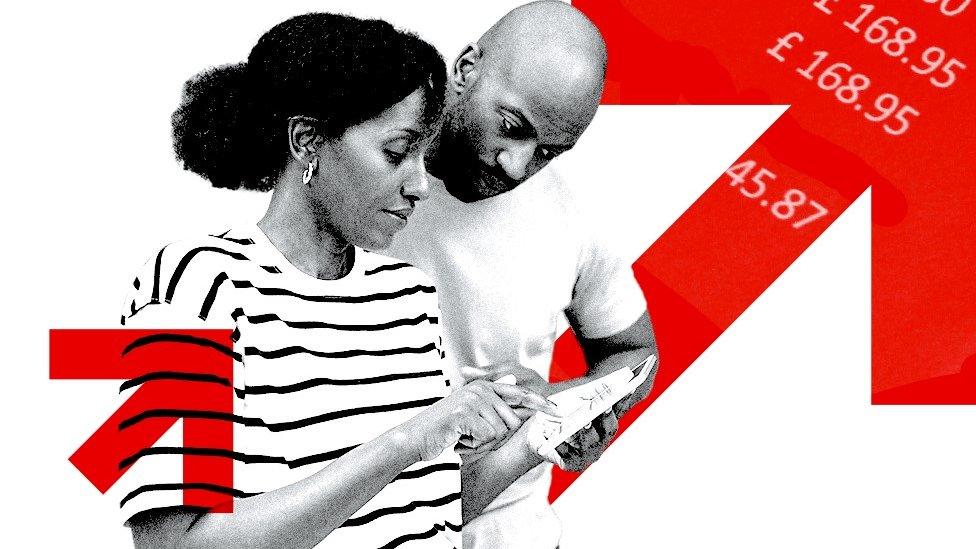Energy bills predicted to drop in October
- Published
- comments

Annual energy bills for a typical household are expected to fall slightly to £1,926 from October, according to a new forecast.
Consultancy firm Cornwall Insight predicts bills could drop by £148 under a new official price cap set to be announced by Ofgem next week.
The energy price cap limits how much suppliers can charge households for each unit of energy they use.
But bills still remain far higher than before Russia's invasion of Ukraine.
Kate Mulvany, senior consultant at Cornwall Insight, told the BBC's Today programme that while wholesale energy prices had been falling, the drop in bills from October will probably be a little less than consumers were hoping for.
"Unfortunately... our forecasting to the end of this decade is that prices are going to stay higher than people were used to before the energy price crisis."
The energy watchdog, Ofgem, sets a maximum price that suppliers can charge customers per unit of gas and electricity.
It applies to households on variable or default tariffs in England, Wales and Scotland, but the actual amount paid by customers will vary depending on the amount of gas and electricity they use.
Changes to the energy price cap come into force every quarter to reflect changes in wholesale prices, and it stood at £2,074 for a typical household in July.
The price of wholesale energy increased as Covid restrictions were eased and then rocketed after Russia's invasion of Ukraine last year.
In October last year, the government stepped in to limit a typical household's annual gas and electricity bill to £2,500. It also gave a £400 winter discount to every household, which was paid in six instalments between October and March.
This support has been wound down, although cost-of-living payments will continue to be made to people on lower incomes and those receiving certain benefits.
'Stubbornly high prices'
The End Fuel Poverty Coalition warned that few customers would feel better off, despite the decrease in the price cap.
"Any declines in wholesale costs are almost cancelled out by the end of the government's Energy Bills Support Scheme, which means bills stay at similar levels to last year while people have less ability to pay these stubbornly high prices," it said.
"This coming winter will not feel any better than last as energy bills remain at dangerously high levels."
Cornwall Insight warned that it was still important that the government explores alternative options for energy bills, such as social tariffs, to make sure they are affordable.
In a statement, external, Cornwall Insight said that the slow reduction of bills along with the "volatility" associated with the energy price cap might mean more customers look to going back to a fixed tariff for their gas and electricity.
"With so many unknowns in the energy market, each household must decide for themselves what is the best avenue for them," its principal consultant Dr Craig Lowrey said.
It also suggested that the UK was particularly susceptible to changes in wholesale prices because of its reliance on gas imports.
According to Ms Mulvany, one of the big drivers behind the high prices being forecast over the next decade is that nuclear power stations in the UK are expected to retire, so they will stop producing a "very substantial amount of energy that the UK relies on".
A spokesman for the Department for Energy Security and Net Zero said that the government "will always ensure that the energy market is working for consumers to protect them from sky-high bills and that households are getting the best deal".

What can I do if I can't afford my energy bill?
Check your direct debit: Your monthly payment is based on your estimated energy use for the year. Your supplier can reduce your bill if your actual use is less than the estimation.
Pay what you can: If you can't meet your direct debit or quarterly payments, ask your supplier for an "able to pay plan" based on what you can afford.
Claim what you are entitled to: Check you are claiming all the benefits you can. The independent MoneyHelper website

- Published3 April 2024

